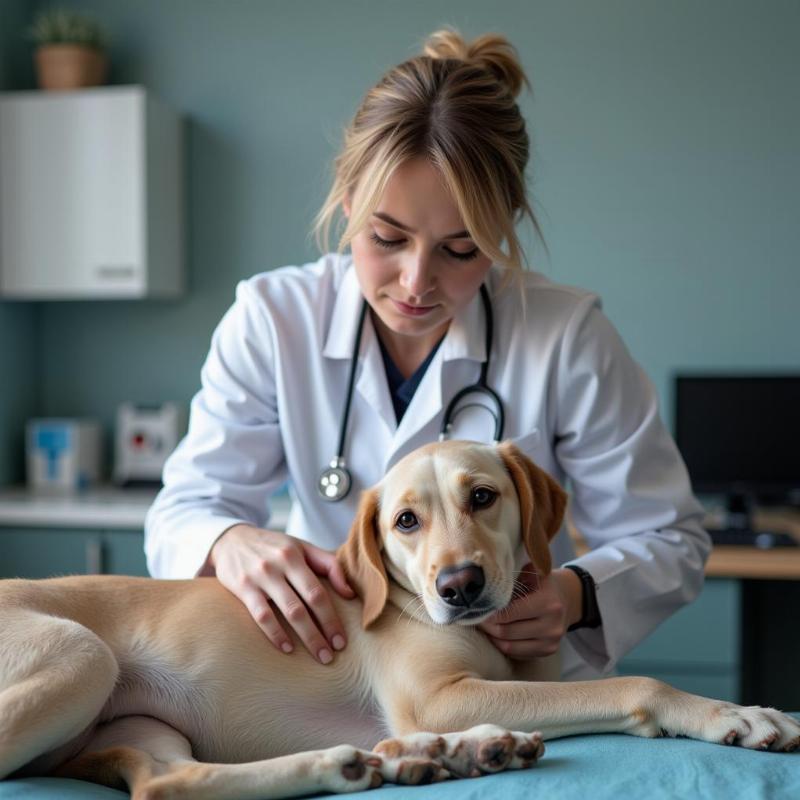After your furry friend undergoes surgery, it’s natural to be concerned about any unusual behavior, especially shaking. Is it normal for dogs to shake after surgery? The short answer is: sometimes. While some post-operative trembling can be expected, it’s crucial to understand the reasons behind it and when to seek veterinary attention.
Understanding Post-Operative Shaking in Dogs
Several factors can contribute to a dog shaking after surgery. Pain is a common culprit. Anesthesia and the surgical procedure itself can cause discomfort, leading to tremors. Think about how you might feel after a major medical procedure – a little shaky, right? It’s similar for our canine companions.
Another common reason is the lingering effects of anesthesia. Just like humans, dogs can experience various side effects as the drugs wear off, including shivering and shaking. This is usually temporary and resolves as the anesthesia completely leaves their system.
Hypothermia, or low body temperature, can also cause shaking. Surgical procedures can sometimes lower a dog’s body temperature, and the chilly environment of a veterinary clinic can exacerbate this. Warm blankets and careful monitoring are essential during recovery.
When to Worry: Signs of a Problem
While some shaking is expected, excessive or prolonged tremors can be a sign of complications. If your dog’s shaking is accompanied by other symptoms like vomiting, difficulty breathing, or pale gums, contact your veterinarian immediately. These could indicate a serious reaction to anesthesia or a post-surgical infection.
 Veterinarian checking a dog
Veterinarian checking a dog
Recognizing Pain-Induced Shaking
How can you tell if your dog’s shaking is due to pain? Look for other signs of discomfort such as whimpering, restlessness, or reluctance to move. If you suspect your dog is in pain, don’t hesitate to contact your vet. They can prescribe pain medication to manage your dog’s discomfort and reduce shaking.
Caring for Your Dog After Surgery
Providing a calm and comfortable recovery environment is crucial. Keep your dog warm and quiet, limiting visitors and activity. Follow your veterinarian’s instructions carefully regarding medication, wound care, and activity restrictions.
“Post-operative care is just as important as the surgery itself,” says Dr. Emily Carter, DVM, of the Animal Medical Center of New York. “Providing a comfortable and supportive environment can significantly aid in your dog’s recovery.”
Tips for Managing Post-Surgical Shaking
- Keep your dog warm: Use blankets or a heating pad (on low setting) to maintain their body temperature.
- Administer prescribed medications: Follow your veterinarian’s instructions carefully.
- Monitor for other symptoms: Watch for any signs of complications like excessive shaking, vomiting, or difficulty breathing.
- Provide a quiet and comfortable recovery space: Minimize noise and distractions.
- Contact your vet if you have concerns: Don’t hesitate to reach out to your veterinarian if you notice anything unusual.
“Early intervention is key,” adds Dr. Carter. “If you notice any concerning symptoms, it’s always best to err on the side of caution and contact your vet.”
Conclusion
While some shaking after surgery is normal for dogs, it’s essential to understand the potential causes and recognize when to seek veterinary attention. By providing a comfortable recovery environment and monitoring your dog closely, you can help ensure a smooth and comfortable healing process. Is it normal for dogs to shake after surgery? Sometimes, but attentive care and communication with your veterinarian are essential for ensuring your furry friend’s well-being.
FAQ
- Q: How long does post-surgical shaking last in dogs? A: It can vary, but shaking due to anesthesia usually resolves within 24-48 hours. Shaking due to pain may persist until the pain is managed.
- Q: What should I do if my dog is shaking uncontrollably after surgery? A: Contact your veterinarian immediately.
- Q: Can I give my dog over-the-counter pain medication? A: Never give your dog human medication without consulting your veterinarian.
- Q: How can I keep my dog warm after surgery? A: Use blankets or a heating pad (on low setting) and avoid exposing them to drafts.
- Q: When can my dog resume normal activity after surgery? A: Follow your veterinarian’s instructions regarding activity restrictions.
- Q: What are the signs of infection after surgery? A: Redness, swelling, discharge, and increased pain around the incision site can indicate infection.
- Q: My dog is shaking and won’t eat after surgery. What should I do? A: Contact your vet, as this could be a sign of pain or other complications.
Beautdogs.us is your premier source for expert advice on dog breeds, care, and stylish living with your canine companion in the US. From puppyhood to senior years, we offer comprehensive and trustworthy information for both novice and experienced dog owners. We specialize in providing up-to-date information on dog breeds, nutrition, training, health, and product reviews. For all your dog-related queries, contact us at [email protected] or call us at +1 501-555-7529. Beautdogs.us – your trusted partner in providing the best possible care for your beloved dog.